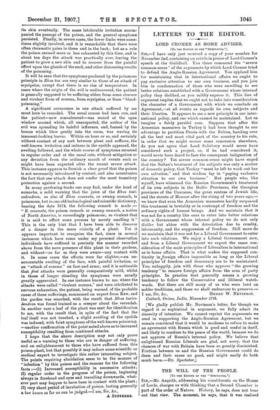LETTERS TO THE EDITOR.
LORD CROMER AS HOME ADVISER.
[To Tux EDITOR or THE " SPRCTATOR.1
SIR,—I have only just received a copy of your number for November 2nd, containing an article in praise of Lord Crooner's speech at the Guildhall. You there commend the "severe common-sense" of the arguments by which Lord Cromer tried to defend the Anglo-Russian Agreement. You applaud him for maintaining that in international affairs we ought to pay exclusive attention to our own business, and you join him in condemnation of those who were unwilling to see better relations established with a Government whose internal policy they disliked, as you mildly express it. This line of argument implies that we ought not to take into consideration the character of a Government with which we conclude an Agreement,—at all events as regards its own subjects and their liberties. It appears to me a new principle in our inter- national policy, and one which cannot be maintained. Let us imagine a fairly parallel case. Suppose that after the Armenian massacres in Turkey it had been thought to our advantage to partition Persia with the Sultan, handing over all the best and most vital part of the country to his rule, in order that we might secure some concession elsewhere, do you not agree that Lord Salisbury would never have considered such a project, or, if he had considered it, would never have dared to face the consequent indignation of the country ? Yet severe common-sense might have urged that the Sultan's treatment of his subjects was only a matter of domestic policy, that Turkey "must be left to work out her own salvation," and that wisdom lay in "paying exclusive attention to our own business." But people who, like myself, have witnessed the Russian Government's treatment of its own subjects in the Baltic Provinces, the Georgian provinces of the Caucasus, the great centres of Jewish life, and the streets of Moscow after the rising of two years ago,— we know that even the Armenian massacres hardly surpassed this treatment in brutality or in contempt of freedom and the ordinary rights of human beings. And we maintain that it was not for a country like ours to enter into better relations with a Government whose internal policy we do not only dislike but abhor with the detestation due to cruelty, inhumanity, and the suppression of freedom. Still more do we maintain that it was not for a Liberal Government to enter into such relations. We enjoy a Liberal Government now, and from a Liberal Government we expect the same con- sideration of the main principles of Liberalism in international as in home affairs. That is what makes the supposed con- tinuity in iforeign affairs impossible as long as the Liberal principles of freedom and democracy are to be maintained. You, unhappily, join with those who approve " the growing tendency" to remove foreign affairs from the area of party principles. In practice that generally means a growing tendency to follow the Conservative and illiberal watch- words. But there are still many of us who were bred on nobler traditions, and those we shall endeavour to preserve.—
I am, Sir, &c., HENRY W. NEVINSON. Cuttack, Orissa, India, November 27th.
[We gladly publish Mr. Nevinson's letter, for though we regard it as sophistical in argument, we fully admit its sincerity of intention. We cannot reprint the arguments we used in supporting the Anglo-Russian Agreement, but we remain convinced that it would be madness to refuse to make an agreement with Russia which is good and useful in itself, and likely to conduce to the peace of the world, because we do not approve of Russia's internal policy. We believe that enlightened Russian Liberals are glad, not sorry, that the chances of war with Britain have been so greatly diminished. Friction between us and the Russian Government could do them and their cause no good, and might easily do both much harm.—En. Spectator.]














































 Previous page
Previous page